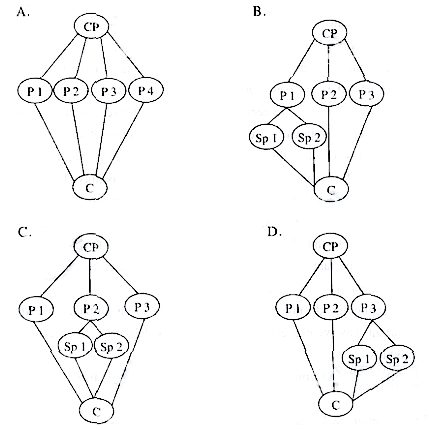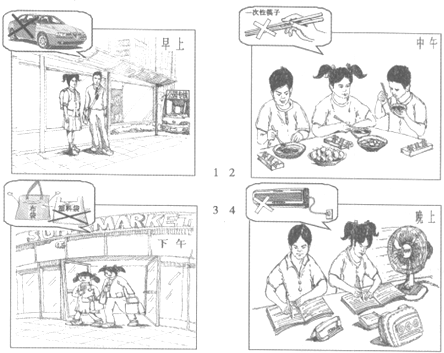题目内容
7.假如你是某中学高一学生赵明,不久前经历了一次地震,你和邻居一起救出了一位受困的人.请你根据下面四幅图片的顺序,以日记形式记下事情的全过程.注意:1.开头已给出.
2.字数不少于60.
3.提示词:锹,铲spade;担架stretcher

Last Saturday morning,a severe earthquake suddenly happened.____________________
_____________________________________________________________________________
_____________________________________________________________________________
_____________________________________________________________________________
_____________________________________________________________________________
分析 本题为漫画式的记叙文类型.用了第二人称.该篇文章需结合漫画内容作答,含两部分,运用一般过去时,第一部分是介绍了自己察觉地震发生后和其他人一起救邻居的事情.第二部分讲述了自己经历地震帮助别人的想法.
重点短语有:Meanwhile(同时) rush out of…(冲出 ) come out of…(出去) together with…(和…一起) It is important to…(重要的)
高分句型:
1.I,together with other neighbors,tried to find the one trapped in the ruins,using spades and even our hands. 我和其他邻居努力去用铁锹甚至是我们自己的手去找被困在废墟里的人.
2.I realize it important to stay calm in time of danger/emergencies and we should unite and face disasters together. 我意识到在在紧急情况下保持镇静很重要,我们应该联合起来一起去面对灾难.
解答 Last Saturday morning,a severe earthquake suddenly happened.I was reading in the room began to violently shake.(介绍救被地震所困的人)The light clock,and many thing in the room were shaking.Meanwhile,someone shouted"Earthquake!"Hearing this,I rushed out of the house without hesitation.When I had just come out of the house,I heard a crash behind me and someone shouting"Help"I looked back and found my house had collapsed.I,together with other neighbors,tried to find the one trapped in the ruins,using spades and even our hands.(高分句型1)After a few minutes,we found an old man his leg was broken but he was alive!We found a stretcher and sent him to a safe place and waited for a medical aid/an ambulance.(描述事情经过)
Through this experience,I realize it important to stay calm in time of danger/emergencies and we should unite and face disasters together.(高分句型2)
点评 在写图表类作文时,首先一定要仔细阅读图表,根据图表内容列出提纲,做到突出主题内容,同时应该灵活运用高级词汇,短语和句式,注意时态的正确使用,最后再次检查审核,确保文章流畅、思路清晰.

| A. | of | B. | for | C. | in | D. | at |
-___a new parking lot.( )
| A. | Build | B. | To build | C. | Building | D. | Built |
Every culture has its own unwritten list of behavior that is acceptable.Every society also has its taboos,or types of behavior that are considered a violation of good manners.
The word taboo comes from the Tongan language and is used in modern English to describe verbal and nonverbal behavior that is forbidden or to be avoided.(71)C They tend to be specific to a culture or country,and usually form around a group's values and beliefs.What is considered acceptable behavior in one country may be a serious taboo in another.
Verbal taboos usually involve topics that people believe are too private to talk about publicly,or relate to one's manner of speaking.In many cultures,for example,it is considered bad manners to discuss subjects such as sex or religion in public.In some countries,the volume (音量) of one's voice may annoy people.(72)F
(73)A For example,one of the biggest differences among many Western,Asian,and African cultures is the use of eye contact (接触).In the US,people make eye contact when they talk to others.(74)G In many Asian and African cultures,however,children are taught to lower their eyes when talking to their elders,or those of higher rank,as a way to show respect.
Certain gestures made with the hands can have very different meanings depending on the country you are in.Crossing your middle finger over your forefinger is the sign for good luck in many western countries.(75)B Also,in some Asian countries,moving your hands a lot while talking,or‘talking with your hands',is considered unsuitable.
Behavior that is acceptable and non-offensive in one culture can be highly offensive in another.When visiting a foreign country,be aware of some of the basic differences,as this will help to ensure a more enjoyable trip.
| A.Nonverbal taboos usually relate to body language. B.In Vietnam and Argentina,however,it is a rude gesture. C.In spite of what some people may think,taboos are not universal. D.Cancer is a taboo subject and people are frightened to talk openly about it. E.Learn a country's customs so that you don't hurt the local people unconsciously. F.They might think that someone who is speaking or laughing loudly is rude or aggressive. G.If a person avoids eye contact,others might think they are being dishonest or unconfident. |
| A. | lay | B. | lies | C. | lie | D. | laid |
| A. | gets | B. | makes | C. | puts | D. | means |

